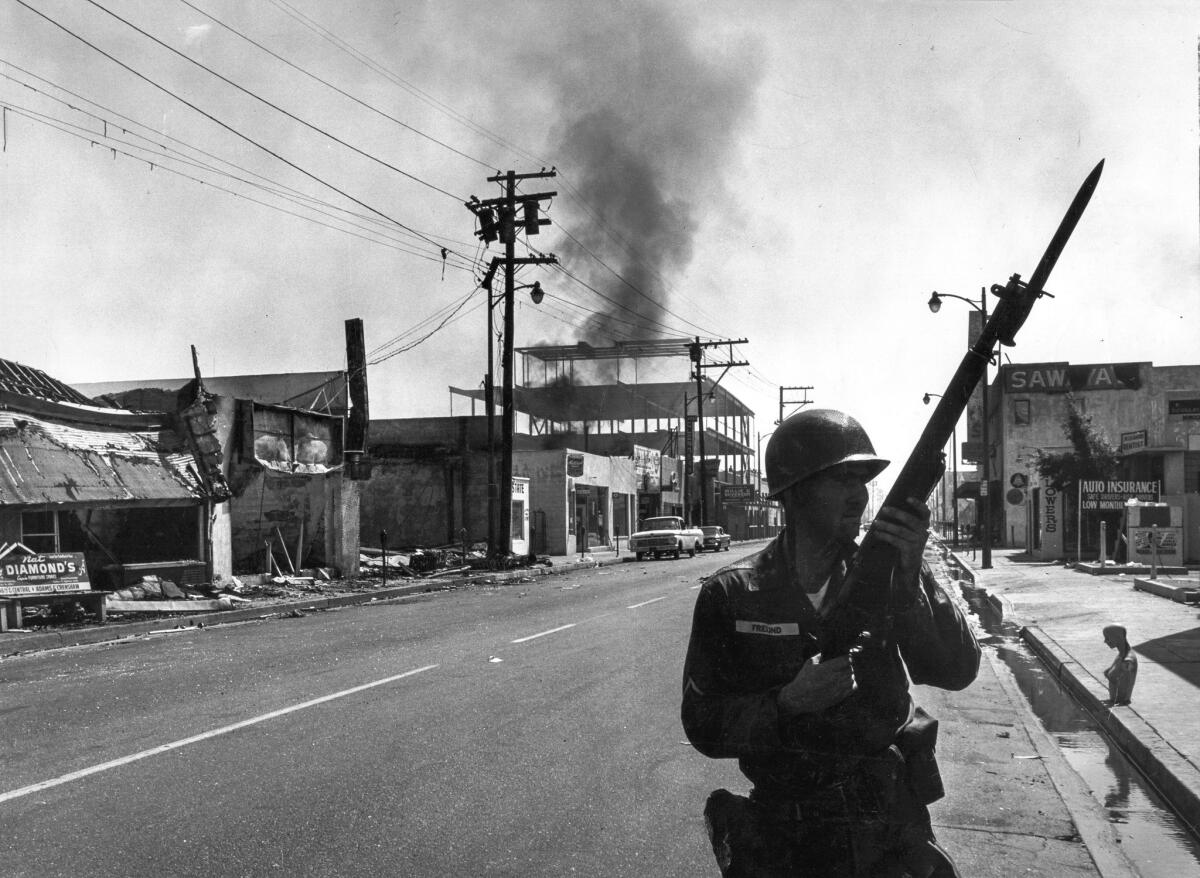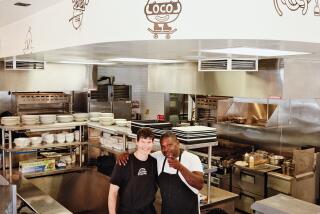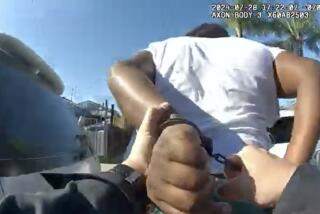Shopkeepers lost dreams, livelihoods in Watts riots

I can’t blame Patrice Fisher for feeling she’s had enough of the Watts riots commemorations that seemed to be everywhere this week.
Those six days of fury in August 1965 changed her life in ways the tributes and coverage didn’t reflect.
Her grandfather, Leo Nemetz, was one of hundreds of shopkeepers whose businesses were burned and livelihoods destroyed. He’d owned a stretch of stores along one of Watts’ main streets for almost 30 years.
As a child, Fisher accompanied him to work during summers and on Saturdays. “I lived to go there,” she said.
Her grandfather never let people leave his market hungry, she said. Customers treated her like family. Grandmothers doted on her, smothering her in hugs.
“Watts was my happy place,” she said. “I was treated like I was so precious.”
Until the neighborhood exploded.
Fisher was 11, watching news of the riots when she caught a glimpse of her grandfather on TV, trying to carry chairs from his furniture store as that building — along with his market, pawnshop and liquor store — was torched.
“After that, it was over,” she told me. “Everything was ruined. We never rebuilt.”
Her grandfather sank into depression, her family struggled financially, and Fisher was left to wonder how people who had been so nice could suddenly consider them the enemy.
“If you ask me the turning point in my life, I would say the riots,” Fisher said. “I’d never known hate before.”
::
The happy place Fisher recalls was as real as the poor, downtrodden Watts that animates history.
She grew up in the Fairfax district, the grandchild of Jews who’d come here from Russia in the 1930s. The neighborhood of her youth seemed solemn and bleak, freighted with Holocaust survivors’ painful memories.
But Watts looked vibrant and colorful from her perch in her grandfather’s store near 103rd and Central, the nexus of nightlife and commerce, where flashy cars and women in fancy dresses livened up the weekend scene.
She’d visit residents with her grandpa. Their houses were small and crowded, but there was always music, food and laughter. Folks socializing on the front porch always made a fuss over her.
“I didn’t realize how poor people were until later,” Fisher said.
Her family’s business was collateral damage in a war the youngster knew nothing about.
That didn’t blunt the loss she felt when those visits to Watts stopped. Or the fear she faced as her family’s fortunes unraveled.
“It was crushing,” she said. “Everybody was emotionally spent.”
For years, she nursed the pain of what felt like betrayal, by a community that she thought had shared the love she felt.
In 1982, she paid a visit to the neighborhood “to see if there was anything left.” She went into a liquor store and bought a drink that required a bottle opener. The clerk behind the counter refused to open it — unless she gave him $2.
“I knew it was over,” she said. “I never went back after that.”
::
The commercial losses racked up by the riots can’t be captured in dollars and cents alone. Their impact rippled through families and reshaped communities.
The 200 businesses looted and destroyed were more than bricks and mortar. They were jobs and dreams — devoured in a cataclysm of rage and need.
Some black-owned stores were leveled, but Jewish businesses bore the brunt of the mob violence. Some had become the focus of resentment in a community stewing over inequality.
Still, many of the shopkeepers were missed by residents who had counted on their counsel and their generosity.
“Jews owned the stores, but they’d hire us,” said Lavada Theus, who remembers when dress shops, shoe stores and millinery shops dotted Watts. “They’d give you jobs, give you credit.… It was hard for a lot of people when those stores were gone.”
Even the merchants whose shops survived knew they might be on borrowed time. Some left for safer neighborhoods. Others, like Harry Londner, stayed on.
A Polish Jew who’d spent World War II as a prisoner in German work camps, he came to California in 1962 and wound up managing Mr G’s Liquor and Deli Market on Wilmington Avenue.
He didn’t know much about America’s racial divide but quickly figured it out, Sheldon Londner said of his father, who died in 2001.
“In Poland, his family had been forced into ghettos and camps,” Londner said. “The Nazis dehumanized people by turning them into numbers. Nobody was allowed to have an individual identity. He saw the same thing happening in Watts, where people were dehumanized by not being treated with respect.”
His father was robbed a few times on the job, and once mugged by a young man he recognized as a longtime customer, Londner said. But he hadn’t allowed the Holocaust to destroy his spirit — and he wasn’t going to let rabble-rousers here sour him on humanity.
“He’d come from a ghetto in Poland to the ghetto in Watts,” Londner said. “He was making barely minimum wage, but he always had sympathy for people less fortunate.”
His father would share his story of survival in Nazi camps with young men struggling because no one would hire them. He’d slip families food when they couldn’t afford it, because he remembered what it felt like to be hungry. He’d lecture men who tried to spend the rent money on booze and summon their wives to come get them.
“His customers loved him for this,” his son said.
And as Watts descended into chaos and the riot reached his block, neighbors of the store formed a ring around Harry Londner’s market and waved the looters off.
Twitter: @SandyBanksLAT
More to Read
Sign up for Essential California
The most important California stories and recommendations in your inbox every morning.
You may occasionally receive promotional content from the Los Angeles Times.











